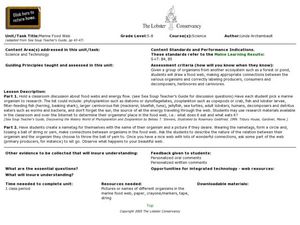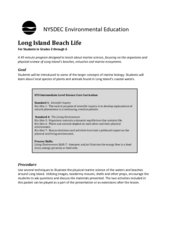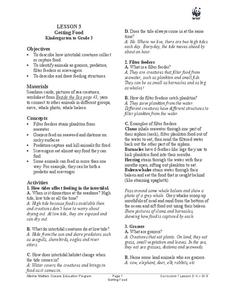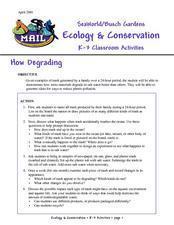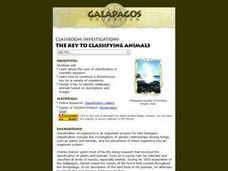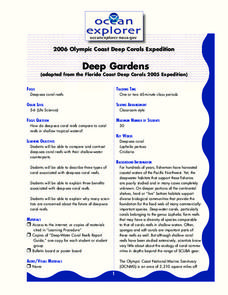NOAA
Understanding Food Chains and Food Webs
Jump into an exploration of marine ecosystems with the first lesson in this four-part series. After first learning about crustaceans, mollusks, and other forms of sea life, young marine biologists view a PowerPoint presentation that...
Curated OER
Marine Food Web
Students investigate the effects of the food chain on all animals by creating a food web. In this seafood lesson, students discuss energy flow and research a specific marine organism of their choice. Students create a food web in their...
Curated OER
Ocean Life Food Web
Students construct a food web representative of the Gulf of California. They use pictures to depict all of the organisms in the appropriate level of the web (producer, primary consumer, etc.)
Curated OER
Long Island Beach Life
Have your class learn about marine life through this resource. This comprehensive lesson plan has learners discuss marine life, learn key vocabulary, discuss environmental concerns, and play games related to migration and predator/prey...
NOAA
Seafood and Human Health
Whether your young biologists realize it or not, humans play a significant role in marine ecosystems. To help them understand this fact children first create graphical representations that show homo sapiens' place in marine food chains,...
NOAA
An Ocean of Energy
Young biologists trace the path of the sun's energy through marine ecosystems in the second part of this four-lesson series. Building on prior knowledge about producers, consumers, and decomposers students are introduced to the concept...
Curated OER
Weave an Aquatic Food Web
Students explore organisms that are part of interconnected food webs. In this food web lesson, students choose an animal and research what the animal eats. Students begin with the food chain and branch out into the interconnected web...
Curated OER
Food Chains and Food Webs
Fourth graders study intertidal organisms and their role in the food web. In this food web activity, 4th graders read the book The Sea That Feeds Us and discuss food webs. Students study pictures of intertidal creatures and discuss their...
Curated OER
Getting Food
Students complete activities to learn about the ocean food web. In this ocean life lesson, students discuss how the tides affect feeding, learn about filter feeders, grazers, predators, and scavengers. Students then group the animals...
Curated OER
Shark Food
Young scholars create a linking chain to demonstrate the food chain. In this food chain lesson, students use the Internet to research sharks, including what they eat, and create a chain link with a picture of a shark. They continue...
MENSA Education & Research Foundation
Ecosystems
Explore the Earth's different ecosystems through four lessons, an assessment, and extension activities. Lessons include informative text and step-by-step instructions to apply knowledge in interactive, and thought provoking ways; such as...
NOAA
Build Your Own Ocean Ecosystem
Hold the sea in the palm of your hand! Amateur oceanographers work together to create models of an ocean ecosystem in the sixth and final installment in a series. Raise awareness of global ocean health issues through guided research,...
Ocean Explorer
Living with the Heat
Young oceanographers study the Submarine Ring of Fire, which is a series of deep-water volcanic vents that come up from the ocean floor. Learners take a close look at the unique ecosystems that are associated with these areas, how these...
Curated OER
Wildlife
First, biology pupils research land and marine habitats along the route of skipper Rich Wilson's Great American II. Then, using colored paper clips scattered across a colored paper background, they play the predator-prey game to...
Global Change
Impact of a Changing Climate on the Pacific Walrus
How many of us can say they've seen a Pacific walrus? Not many and one of the reasons is the impact of climate change on their aquatic environment. Children get to think about the food web of the Bering Sea by creating an actual web with...
SeaWorld
Ecology & Conservation
How much trash does an average family produce in 24 hours? Where does that trash end up? Get your youngsters thinking about ecology and conservation as they discuss the impact pollution has on the marine environment. After a deep...
NOAA
Sustaining Our Ocean Resources
Lead young scientists on an investigation of fishery practices with the final installment of this four-part unit. Using a PowerPoint presentation and hands-on simulation, this activity engages children in learning how fish populations...
Curated OER
A House for Me- Ocean Environments
Students explore ocean environments. In this ocean environment lesson, students identify the things ocean animals need for survival. Students use KWL charts and search the Internet collecting information about ocean habitats. Students...
Curated OER
Introduction to Ocean Grazers
Students explore biology by creating a poster with classmates. In this oceanography lesson, students identify the importance of coral reefs to the ocean's ecology and examine a food web of ocean animals. Students define a list of...
Michigan Sea Grant
Invasive Species
Learners identify invasive species to the Great Lakes and analyze their impact on the ecosystem. Using photo cards with pictures and facts, young scientists work in small groups to match invasive species with their corresponding...
Curated OER
The Key To Classifying Animals
Explorers of the environment construct a dichotomous key for a variety of organisms and design a key to classify Galapagos animals based on descriptions and images. The lesson includes a link to an animal gallery and the worksheet for...
Curated OER
Deep Gardens
Students investigate the differences and similarities between shallow-water and deep-sea coral reefs. In this coral reef lesson, students research and compare the characteristics of reefs. Students describe various lifeforms in coral...



